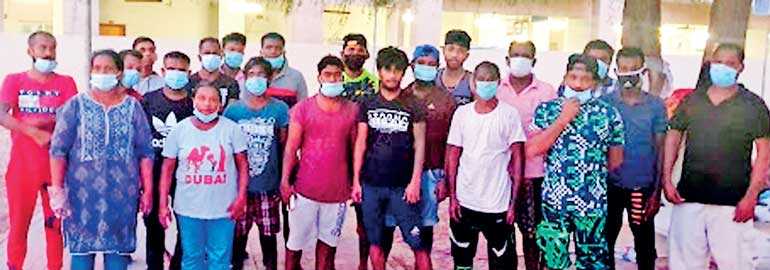Saturday Feb 21, 2026
Saturday Feb 21, 2026
Wednesday, 25 November 2020 00:00 - - {{hitsCtrl.values.hits}}

The 2021 Budget proposal was written while reports of migrant workers in crisis were broadcast in the news and over social media platforms. It is bizarre and appalling that the need to care for and safeguard these migrant workers was overlooked in the proposal
The 2021 Budget proposals make a few special attempts to address issues faced by women. While women-centric policy is always welcome, some of the areas mentioned appear to have been poorly conceived; especially with regard to foreign employment. 
Under the section of ‘Foreign Employment,’ the Budget states: “About 1.5 million people in our country are engaged in foreign employment. The majority of them are women from rural areas with low income.”
It goes on to state that from 2010 to 2014 foreign income earnings rose from $ 4 billion to $ 7 billion. That is indeed remarkable. But how has the same Government, that is back in power now, cared for these unskilled and semi-skilled workers who contributed to this prodigious increase in income generation they boast of so proudly?
As we have seen with the COVID-19 pandemic, many of these workers were treated despicably by the Government since our borders were shut earlier this year. Several Sri Lankan workers in the Middle East approached their Sri Lankan embassies but were shut out.
In July, a group of Sri Lankan migrant workers who gathered outside the Sri Lankan embassy in Jordan demanding to be repatriated, were tear gassed and 20 of them were hospitalised. Many Sri Lankan workers across the Middle East had to sleep on the streets, with little or no access to food and clean drinking water.
It was only after several months of campaigning that the Government initiated repatriation flights via SriLankan Airlines. Begrudgingly though; the price of flight tickets were around Rs. 100,000, a sum too high to be borne by unskilled workers who had no income for months on end. These citizens, who have contributed the most to our economy, were dispensable.
This pariah treatment of migrant workers is not limited to the COVID-19 pandemic. We have a long history of women domestic migrant workers returning to Sri Lanka after suffering years of abuse and torture at the hands of their employers. These women received little to no support from Sri Lankan embassies in their country of employment. Given that we also have a long history of dependence on the remittances of migrant workers, it is astounding that no serious efforts have been made to support and safeguard these communities.
The 2021 Budget proposal turns a blind eye to this need as well. It completely overlooks the need to protect our migrant workforce, and instead speaks of incentivising remittances by paying Rs. 2 for every USD they send back to Sri Lanka. A clear indication that they see these workers as dispensable money machines, not human.
The proposals add that programmes will be initiated to enable those in rural areas to obtain skills at vocational training institutes.
In his one year in office anniversary speech, President Gotabaya Rajapaksa stated: “By now, plans have been completed to take all the Nurses Teaching Schools under the purview of one university with the aim of providing the opportunity for the nurses to upgrade their qualifications to a Bachelor’s Degree level instead of Nursing Diploma. With the implementation of this initiative, doors will be open for them to enter foreign job market.”
It is commendable that effort is being made to provide rural job seekers with skills, and this initiative should certainly be executed. But, in the wake of the COVID-19 pandemic, there are bigger priorities.
The Sri Lankan economy has taken a massive blow this year, and is unlikely to pick up any time soon. This means a greater number of the population will plummet into poverty, and many will seek quick solutions such as unskilled migrant work to earn an income. Very few will have the luxury of dedicating a few years to studying nursing or other skills and eventually obtain a Bachelor’s Degree. Desperation for unskilled jobs herald dangers such as human trafficking and extortion. Must the government be reminded of Rizana Nafeek and her tragic end? Her family was in dire poverty, and her documents were forged out of desperation.
If the Government wishes to continue relying on remittances from skilled and unskilled migrant workers, safety nets must be placed in embassies to ensure their wellbeing. Mechanisms must be introduced to crackdown on unregistered private foreign employment companies and individuals who recruit and exploit unsuspecting job seekers. State funds could be allocated to expand embassies to include dorms to temporarily shelter foreign workers who are abused or need to be repatriated for other reasons.
In President Gotabaya Rajapaksa’s manifesto ‘Vistas for Prosperity and Splendour’ released prior to the Presidential Election last year, it is stated: “Our embassies in the Middle East will be made to bear greater responsibilities in protecting Sri Lankan housemaids working in those countries.”
Fast forward one year later, no such attempt has been made, but much to the contrary, in August this year it was reported that the Government planned to shut down labour and welfare units in Sri Lanka’s foreign missions in 14 countries as a cost-cutting measure.
The 2021 Budget proposal was written while reports of migrant workers in crisis were broadcast in the news and over social media platforms. It is bizarre and appalling that the need to care for and safeguard these migrant workers was overlooked in the proposal. These proposals lack the foresight to place safety nets at embassies as we navigate this pandemic and face post-pandemic impacts.
The writer is a researcher in gender and minority rights, and is a member of Liberation Movement.